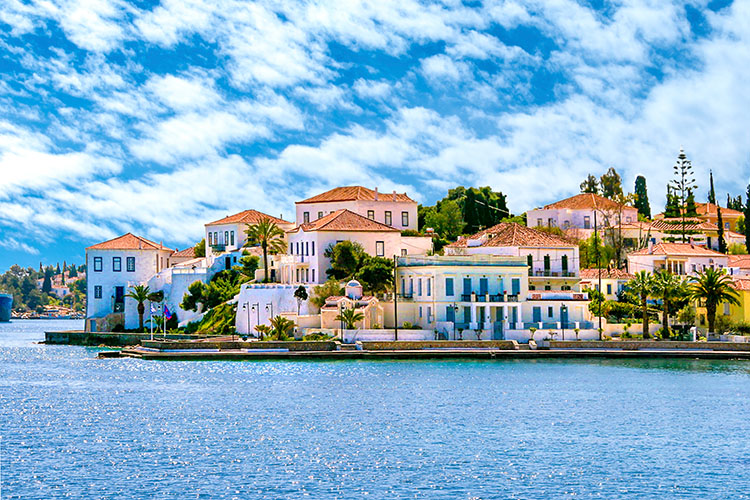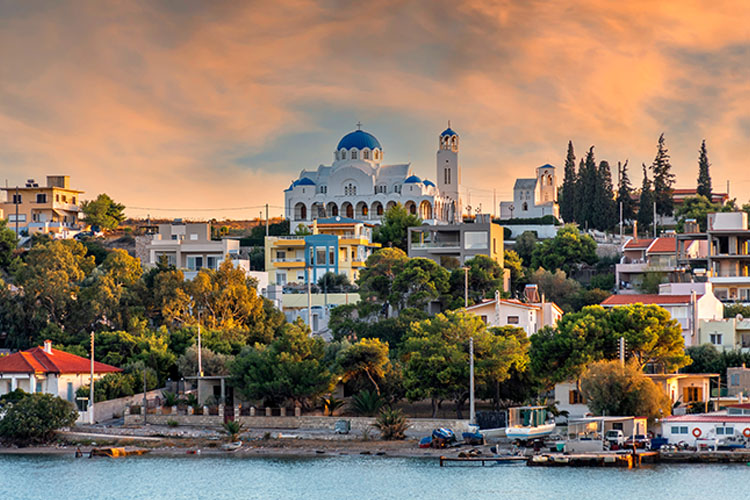
A Mediterranean Gem
Salamis Island, a picturesque gem nestled in the Saronic Gulf of the Mediterranean, is steeped in history that spans millennia. Its rich tapestry of stories and events has left an indelible mark on the island and its people. From its mythological origins to its pivotal role in the ancient world and its continued importance in modern times, the history of Salamis is a captivating narrative that invites exploration.
Mythical Origins and Ancient Settlements
According to Greek mythology, Salamis was named after the nymph Salamis, the daughter of the river god Asopus. Legends suggest that she was abducted by the god Poseidon and brought to the island, where they had children together. These tales interweave divine elements with human history, and such mythological origins continue to influence the island's identity.
The island's early history was marked by the establishment of settlements, with evidence of human habitation dating back to the 3rd millennium BC. Over the centuries, Salamis attracted various civilizations, including the Mycenaeans and Athenians. The Athenians established a colony on the island during the 6th century BC, cementing its role as a strategic outpost and naval power. Salamis played a crucial part in the Persian Wars, most notably during the Battle of Salamis in 480 BC, where the combined Greek fleet decisively defeated the Persian navy. This pivotal victory not only secured the island's place in history but also ensured the continued growth of Greek culture and the flourishing of Athens as a center of ancient civilization.
The island's early history was marked by the establishment of settlements, with evidence of human habitation dating back to the 3rd millennium BC. Over the centuries, Salamis attracted various civilizations, including the Mycenaeans and Athenians. The Athenians established a colony on the island during the 6th century BC, cementing its role as a strategic outpost and naval power. Salamis played a crucial part in the Persian Wars, most notably during the Battle of Salamis in 480 BC, where the combined Greek fleet decisively defeated the Persian navy. This pivotal victory not only secured the island's place in history but also ensured the continued growth of Greek culture and the flourishing of Athens as a center of ancient civilization.
Roman Rule and Byzantine Legacy
The island's history continued to unfold as it transitioned from Athenian rule to Roman domination. During the Roman period, Salamis Island witnessed a merging of cultures and the construction of various structures, including baths, temples, and villas. The Roman presence left a mark on the island's landscape, and many remnants of this era can still be explored by modern visitors.
As the Roman Empire declined and the Byzantine Empire rose to power, Salamis Island found itself within the sphere of Byzantine influence. The Byzantine era brought Christianity to the island, with the construction of churches and monasteries, some of which still stand today, serving as a testament to the enduring impact of this period.
As the Roman Empire declined and the Byzantine Empire rose to power, Salamis Island found itself within the sphere of Byzantine influence. The Byzantine era brought Christianity to the island, with the construction of churches and monasteries, some of which still stand today, serving as a testament to the enduring impact of this period.
Ottoman Rule, Independence, and Modern Times
Salamis Island experienced a series of changes in the subsequent centuries, falling under the rule of various empires, including the Venetians and Ottomans. The Ottoman Empire's control of the island lasted for centuries, during which time Salamis played a role in regional trade and the broader Mediterranean geopolitical landscape.
The 19th century marked a significant turning point as Greece fought for its independence from the Ottoman Empire. Salamis Island, with its historical significance and strategic location, was a key player in this struggle. The Battle of Salamis in 1821 was a crucial moment in the Greek War of Independence, which eventually led to the liberation of Greece from Ottoman rule. Salamis became part of the newly established Greek state, and the island's identity as a symbol of Greek history and heritage was solidified.
Today, Salamis Island is a vibrant and picturesque destination that combines its rich history with modern amenities. Visitors can explore ancient ruins, Byzantine churches, and Ottoman architecture, providing a unique opportunity to journey through time. The island's natural beauty, from its pristine beaches to its lush landscapes, continues to enchant travelers from around the world.
In conclusion, the history of Salamis Island is a captivating narrative that unfolds over the millennia. From its mythological origins to its pivotal role in ancient battles and its enduring legacy as a symbol of Greek independence, Salamis Island stands as a testament to the enduring human spirit and the power of history to shape a place and its people. Today, it welcomes visitors to explore its rich tapestry of history and enjoy the beauty of a Mediterranean gem that has witnessed the rise and fall of empires and continues to thrive in the modern world.
The 19th century marked a significant turning point as Greece fought for its independence from the Ottoman Empire. Salamis Island, with its historical significance and strategic location, was a key player in this struggle. The Battle of Salamis in 1821 was a crucial moment in the Greek War of Independence, which eventually led to the liberation of Greece from Ottoman rule. Salamis became part of the newly established Greek state, and the island's identity as a symbol of Greek history and heritage was solidified.
Today, Salamis Island is a vibrant and picturesque destination that combines its rich history with modern amenities. Visitors can explore ancient ruins, Byzantine churches, and Ottoman architecture, providing a unique opportunity to journey through time. The island's natural beauty, from its pristine beaches to its lush landscapes, continues to enchant travelers from around the world.
In conclusion, the history of Salamis Island is a captivating narrative that unfolds over the millennia. From its mythological origins to its pivotal role in ancient battles and its enduring legacy as a symbol of Greek independence, Salamis Island stands as a testament to the enduring human spirit and the power of history to shape a place and its people. Today, it welcomes visitors to explore its rich tapestry of history and enjoy the beauty of a Mediterranean gem that has witnessed the rise and fall of empires and continues to thrive in the modern world.




